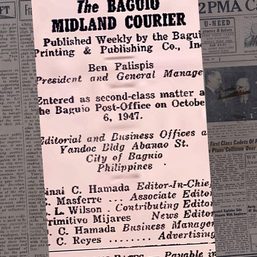SUMMARY
This is AI generated summarization, which may have errors. For context, always refer to the full article.
![[In This Economy] Small wins matter in the fight against Martial Law denialism](https://www.rappler.com/tachyon/2024/02/fight-against-martial-law-denialism-February-23-2024.jpg)
Almost two years into the Marcos Jr. administration, there are continuing efforts to whitewash the Martial Law dictatorship (1972-1986) and, at the same time, downplay the importance of the EDSA People Power Revolution (February 22-25, 1986).
For instance, in September 2023, the Department of Education dropped the term “diktadurang Marcos” (Marcos dictatorship) and instead just put “diktadura” in the new MATATAG basic education curriculum.
On the face of it, this seems an innocuous edit. But it’s particularly pernicious because it’s a form of institutionalized whitewashing. Teachers all over the nation will have to use this whitewashed term.
Meanwhile, In February 2024, PHLPost created commemorative stamps to mark the hundredth birthday of Juan Ponce Enrile, Marcos Sr.’s former defense minister.
Said Postmaster General Luis Carlos, “Living to 100 years old is one of life’s greatest achievements, and definitely a milestone worth celebrating. We pay tribute to JPE whose political career has spanned over six decades…. His collective wisdom and experience is an inspiration to us all.”
But should we glorify the man whose fake ambush was used to justify the declaration of Martial Law on September 23, 1972, and who later became a top crony who profited immensely from various logging concessions that accelerated deforestation?
And then, of course, in October 2023, President Marcos Jr. excluded February 25, 2024 as a public holiday that’s supposed to mark the 38th Anniversary of the EDSA People Power Revolution. We knew something like this would happen when Marcos won the presidency in May 2022.
Survey says
Data can shed light on why it’s so easy for the regime to glorify Martial Law and downplay People Power.
The graph below summarizes findings in a new paper titled, “They Never Left: Popular Impressions of Ferdinand E. Marcos as President After February 1986.” This was authored by SWS fellows Jorge Tigno, Geoffrey Ducanes, Steven Rood, and Vladymir Joseph Licudine, and published in September 2023.
In at least four surveys starting in 1986, SWS was able to conduct polls asking Filipinos about their sentiments about Ferdinand Marcos Sr. Interestingly, just a few years after EDSA, Filipinos’ perceptions of Marcos Sr. significantly and undeniably became more positive.
For the claim that Marcos Sr. was “caring for friends who enriched themselves by pocketing government funds,” 70% agreed in 1986, but only 50% agreed in 1995, just nine years later. That’s a statistically significant drop.
As for the statement that Marcos Sr. was a “severe, brutal or oppressive president,” 45% agreed in 1986 (not even a majority), and only 39% agreed in 1995.
On the flip side of the coin, too many people placed Marcos Sr. in a positive light too quickly.
In 1986, 39% agreed that Marcos Sr. was a “defender of the poor and oppressed”, and 42% agreed that he was “true to the duties of a patriotic president.” In 1995, 55% and 57% (more than half) agreed with these statements, respectively.
Fast forward to 2022, a lot more people agreed that Marcos Sr. was “good,” while much fewer agreed that he was “bad.” This may be because the SWS survey was done in June 2022, when Marcos Jr. had already won the presidency.
But at the same time, the proliferation of disinformation and influencer campaigns between 2016 and 2022, as well as the poor teaching of Philippine history over many decades, may also have contributed to this lamentable outcome.
On top of everything, the Marcos Jr. administration is actively, if not aggressively, triggering authoritarian nostalgia by reviving many policies of Marcos Sr.
Examples include the Kadiwa stores, Masagana 99, the “golden age of infrastructure,” Maharlika Investment Fund, and Bagong Pilipinas (obviously a callback to Marcos Sr.’s Bagong Lipunan).
Fighting back
The task before historians and educators these days is tougher than ever. Everything is stacked against those who want to spread facts and truths about Martial Law and EDSA.
But…not exactly everything. Here and there, there are pockets of resistance offering glimpses of hope.
For one, more and more academics are pushing back by writing new books and articles about the Martial Law dictatorship. These include Marcos Lies (by researchers of the UP Third World Studies Center), The Marcos Era: A Reader (edited by Leia Castañeda Anastaco and Jojo Abinales), and my very own False Nostalgia: The Marcos “Golden Age” Myths and How to Debunk Them (published by Ateneo University Press).
I’m happy to share that in the first year since it was published, False Nostalgia has had four print runs already, and is constantly out of stock in online shops. But I’m most elated by the fact that public school teachers are sending me photos of them using the book as a reference in their Araling Panlipunan (Social Studies) classes. A small win, but it’s nothing short of elating. And I hope many more teachers and students get to use the book.
But just like what I said last year, books won’t be nearly enough. We need to create and amplify content on social media platforms where most Gen Zs get their information.
We also need to do more of these discussions in person. It’s one thing to like and share each other’s social media posts or attend talks in Zoom, another if we get to converse with one another, face-to-face.
Here, I try to do my fair share. In 2023, I brought False Nostalgia to 14 talks all over the country, including Los Baños, Iloilo, Bacolod, Baguio, Naga, and Metro Manila of course. Just yesterday, I came from Palawan State University, which hosted a whole-day series of talks on various aspects of Martial Law and the EDSA commemoration.
It’s not always easy to organize talks and fora on Martial Law issues, because in many cases such discussions are being actively repressed by education authorities who try to toe the administration’s line. That is why schools and student orgs and NGOs that actually get to do these talks are to be commended for their bravery and commitment to the truth.
Interestingly, most of my book talks over the past year were hosted by private schools and universities which are not beholden to education officialdom. In a recent talk at Assumption College, for example, I was heartened by the fact that senior high school students taking up Humanities and Social Sciences (HUMSS) converted their classrooms into museum exhibits about various aspects of Martial Law, and these exhibits were toured by their non-HUMSS peers. What a creative and fun way for students to engage!
I’m come to realize over the past year that if we are to make any headway, we need to embed and institutionalize the teaching of Martial Law history in curricula. But I hope this can be done by the Department of Education most of all. At the same time, I hope they can also permanently include online literacy and fact-checking in the new basic education curriculum.
At the higher education level, Martial Law must be a required subject just like the Life and Works of Rizal.
In coming years, expect even more efforts on the part of the Marcoses and their friends to lionize the Marcoses and erase any hint of the dictatorship’s gross abuses and corruption. But I also hope we can boost the resistance and rope in as many people as possible.
A hard task, but one that’s not impossible. – Rappler.com
JC Punongbayan, PhD is an assistant professor at the UP School of Economics and the author of False Nostalgia: The Marcos “Golden Age” Myths and How to Debunk Them. The book is available on Lazada, Shopee, Fully Booked, and Solidaridad Bookshop.
1 comment
How does this make you feel?

![[OPINYON] Tungkol sa naging viral na social media conjecture](https://www.rappler.com/tachyon/2024/07/thought-leaders-conjecture-07262024.jpg?resize=257%2C257&crop_strategy=attention)



![[Newspoint] A Freedom Week joke](https://www.rappler.com/tachyon/2024/06/20240614-Filipino-Week-joke-1.jpg?resize=257%2C257&crop_strategy=attention)



![[Bodymind] Forgiveness, Enrile, and Bongbong Marcos Jr.](https://www.rappler.com/tachyon/2024/03/forgiveness-enrile-bongbong-march-6-2024.jpg?resize=257%2C257&crop=411px%2C0px%2C1080px%2C1080px)
![[Closer Look] ‘Join Marcos, avert Duterte’ and the danger of expediency](https://www.rappler.com/tachyon/2024/06/TL-trillanes-duterte-expediency-june-29-2024.jpg?resize=257%2C257&crop_strategy=attention)



![[In This Economy] Marcos’ POGO ban is popular, but will it work?](https://www.rappler.com/tachyon/2024/07/thought-leaders-marcos-pogo-ban.jpg?resize=257%2C257&crop=255px%2C0px%2C720px%2C720px)
![[Rappler Investigates] POGOs no-go as Typhoon Carina exits](https://www.rappler.com/tachyon/2024/07/newsletter-graphics-carina-pogo.jpg?resize=257%2C257&crop=424px%2C0px%2C1080px%2C1080px)




![[Bodymind] Juan Ponce Enrile’s hundred years of happiness](https://www.rappler.com/tachyon/2024/02/tl-enrile.jpg?resize=257%2C257&crop=233px%2C0px%2C720px%2C720px)
![[EDITORIAL] Juan Ponce Enrile: 100-year-old chameleon](https://www.rappler.com/tachyon/2024/02/animated-juan-ponce-enrile-100-carousel.jpg?resize=257%2C257&crop_strategy=attention)
I agree: “A hard task, but one that’s not impossible.” Perhaps a better approach would be systematic planning and efficient and effective implementation of such a plan.